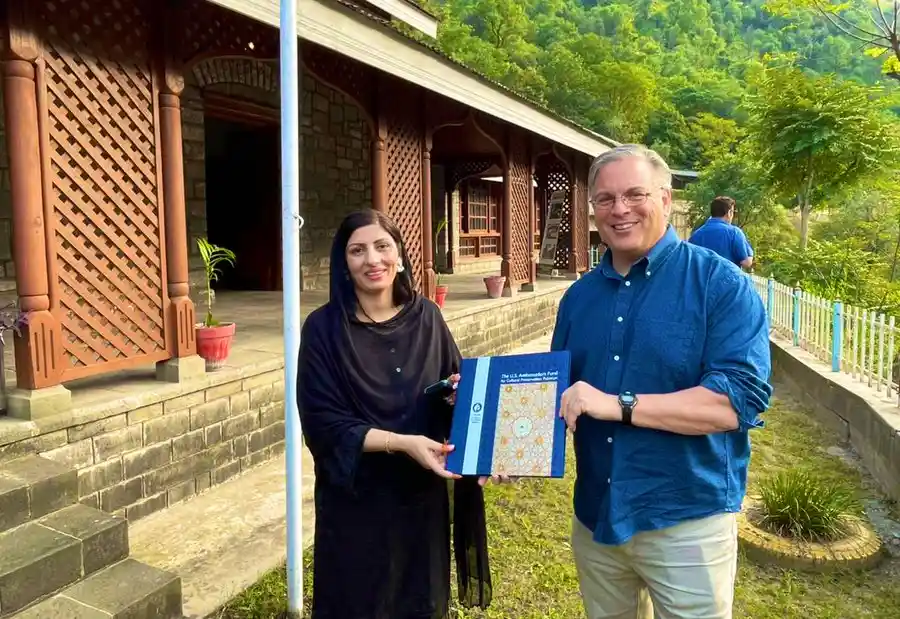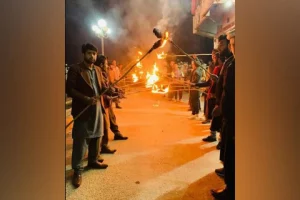The US is going about systematically restoring ties with war-on-terror ally Pakistan, that had once sent Washington and its fearsome military on a wild-goose chase for a decade looking for Osama bin Laden in the wilds of Afghanistan. Laden was finally found sheltering under the nose of the Pakistani army.
The US ambassador to Pakistan, Donald Blome visited Pakistan Occupied Kashmir (POK) on Monday to plant a sapling at the ‘University of Azad Jammu and Kashmir (UAJK)’ and lay a wreath to the victims of the 2005 earthquake.
He also visited other landmarks in Muzaffarabad and did not forget to refer to POK as “Azad Jammu & Kashmir”.
Ambassador Blome laid a wreath to honor the victims of the 2005 earthquake at the Earthquake Memorial Site, Muzaffarabad. Throughout our 75-year partnership, the U.S. has stood by Pakistan at moments of great need. 1/3 pic.twitter.com/8xofvHWfxl
— U.S. Embassy Islamabad (@usembislamabad) October 4, 2022
By visiting the disputed region, that was forcibly annexed by Pakistan in 1947 through a joint military raid by tribals, Pakistani Army and non-State actors, the US has sent another signal to India that the US will play its cat and mouse games in the region to keep India uncomfortable.
Attaching considerable significance to the POK visit, the US embassy in Islamabad has issued a series of tweets over the last three days, detailing minutely the US envoy’s itinerary in the disputed region. The embassy said: “The Quaid-e-Azam Memorial Dak Bungalow symbolizes the cultural and historical richness of Pakistan and was famously visited by Jinnah in 1944. I’m honored to visit during my first trip to AJK”.
The US made it a point to highlight how it has been helping Pakistan in a holistic manner–restoring Pakistani heritages and cultural sites to providing significant humanitarian relief supplies during the 2005 earthquake to lately providing “over $66 million in cash, food, and health assistance” as devastating floods ravage Pakistan.
While reiterating an important highlight about humanitarian aid in the US-Pakistan bilateral relations, Blome was also posting a repartee to China over the latter chiding Washington to do more to help Pakistan in its hour of crisis–the floods.
Early last week, the Chinese Foreign Ministry had chided the US by saying: “Instead of passing unwarranted criticism against China-Pakistan cooperation, the US side might as well do something real and beneficial for the people of Pakistan”.
The seething Chinese response was delivered by spokesperson Weng Wenbin in the daily foreign ministry’s briefing as the US and China fight to gain Islamabad’s affections.
Early last week, US Secretary of State Antony Blinken after a meeting with Foreign Minister Bilawal Bhutto Zardari in Washington had said: “I also urged our colleagues to engage China on some of the important issues of debt relief and restructuring so that Pakistan can more quickly recover from the floods”.
The US ambassador’s POK visit is also about balancing India, which has been carving out its own path in regional conflicts like the Russia-Ukraine war and the China-Taiwan crisis.
Didn’t know mankind’s future is in India’s hand & depends on its clearer commitment to democracy. For 75 years democratic India has been sanctioned for decades by US led West which introduced Islamic jihad in our region thru Pak. Communist China biggest trade partner of US. https://t.co/7KFew0KokY
— Kanwal Sibal (@KanwalSibal) October 3, 2022
During the UN General Assembly week in New York, and later in deliberations and engagements in Washington, External Affairs Minister S Jaishankar was forthright in his observations about the US announcing maintenance and military equipment support of $450 million to Pakistan’s F-16, for counter-terrorism. Pakistan had reportedly used the fighters to attack India in 2019 soon after its terror groups killed 40 Indian para-military personnel in Pulwama, J&K.
The Pakistani army has been using its helicopter gunships to mount attacks in rural Balochistan, often against halpess Baloch populations. Two of its helicopters have been reportedly shot down by Baloch insurgents in the last two months.
Jaishankar had said that the relationship between the US and Islamabad will neither serve the interests of America nor of Pakistan. He said: “It’s really for the United States today to reflect on the merits of this relationship and what they get by it. For someone to say I am doing this because it is all counter-terrorism content and so when you are talking of an aircraft like a capability of an F-16 where everybody knows, you know where they are deployed and their use,” obliquely referring to the use of the F-16 against Indian territory.
Pakistan which sits at a geo-strategic location is important for Washington to keep India under check while keeping an eye on the developments in Taliban-run Afghanistan. For China, Pakistan serves as the gateway to the strategic Indian Ocean Region through the Gwadar port in Balochistan, helping secure trade and energy supplies. This geographical importance has allowed Islamabad to play both sides for decades, but the situation is changing as the US and China spar with each other over trade, global influence, Taiwan and critical technology.
India should be in the vicinity of the US economy in 20 years: Former ambassador Manjeev Puri




















